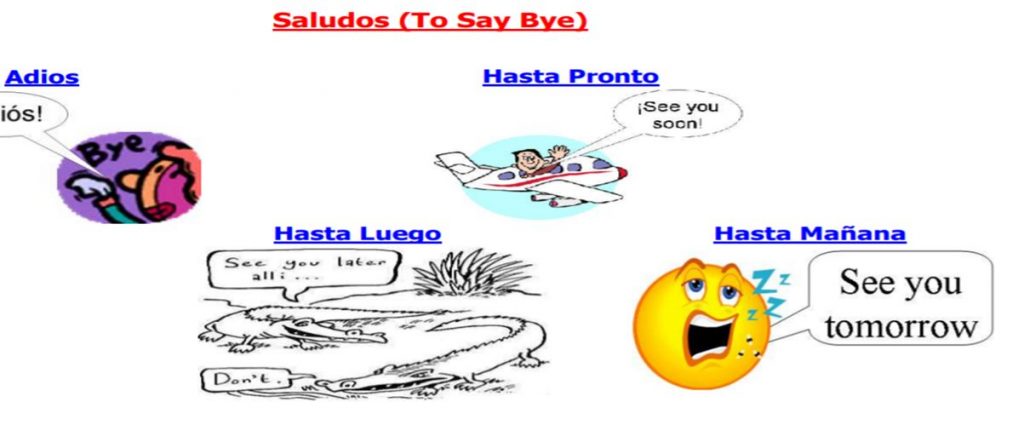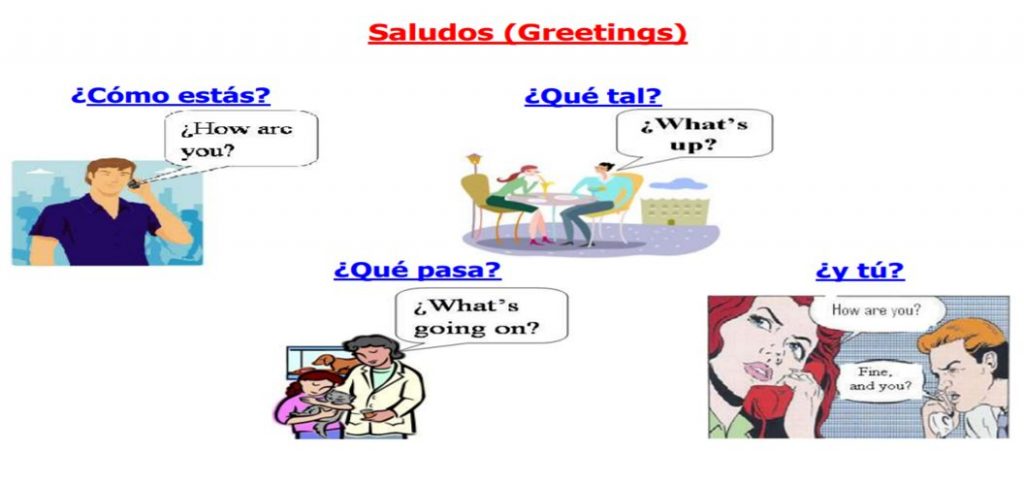Simple greetings and farewells
★ LOS SALUDOS (GREETINGS)
How do you greet someone in your native language?. We usually say hello or good morning
/afternoon/ night. Let us learn some useful Spanish greetings.
◦Hola- Hello
◦Como estas?- How are you?
¿Cómo estás? – How are you? (used with friends or family)
● ¿Cómo está usted? – How are you? ( more formal; used with strangers, more senior persons ,
etc.)
◦Bien- well, muy bien gracias- I am good thank you,
Mal- bad
◦Buenos dias- good morning
◦Buenas tardes- good afternoon
◦Buenas noches- good night
◦Bienvenido- welcome
◦Que pasa- whats up
◦Hasta luego- see you later
◦Hasta manana- see you tomorrow


Dialogue
Practice reading the following dialogues. Use the vocabulary chart to help you translate into
English.
A.
Eduardo: ¡ Hola! Ramon.
Ramon: Hola, Eduardo.
Eduardo: ¿Cómo estás?
Ramon: Muy, bien gracias.
B
Eduardo: Buenos dias Señorita Elena.
Señorita Elena: Buenos días Eduardo.
Eduardo: ¿Cómo está usted?
Señorita Elena:Bien, gracias.
What did you notice after reading the dialogues?.
Note: Hola, me llamo Eduardo. ( Hello, my name is Eduardo).
Hola is an informal way of greeting someone. You say ‘hola’ to your friends and classmates.
Buenos días, buenas tardes and buenas noches are all formal. You use them to address people you
don’t know well, people to whom you owe respect.
Respond to the following situations in Spanish.
- Your teacher walks into the classroom at 10 am. How do you greet him/her?
- You are passing your friend in the corridor. How do you greet him/her?
- You notice a man who appears to be sick at the bus stop. What do you ask him?
: After you greet someone, you’ll want to ask how they are or how’s it going. Here are some
common questions that follow a greeting in addition to how are you?.
Vocabulary
● ¿Cómo te va?- How ‘s it going?
● ¿Cómo has ido?- How’ve you been?
8
● ¿Qué tal?- What ‘s up?
● ¿Qué pasa?- What ‘s happening?
● ¿Qué haces?- What are you doing?
Note: What could you say if someone asks you one of the questions above?
● Bien, gracias- Well, thanks.
● Muy bien -Very well.
● Como siempre- As always.
● Un poco cansado (for men)- A little tired.
● Un poco cansada (for women)- A little tired.
● Estoy enfermo (for men)- I’m sick.
● Estoy enferma (for women)- I’m sick.
● Más o menos- Okay, so-so.
● Todo bien- All good.
● Nada- Nothing.
Note: If someone is unwell you can say ‘Lo siento’ (I am sorry).